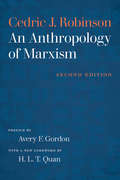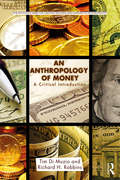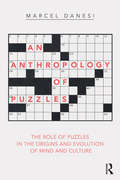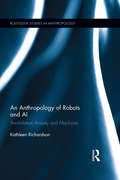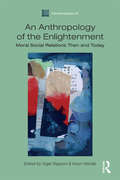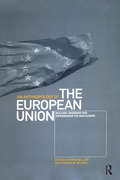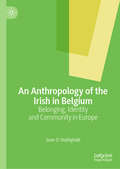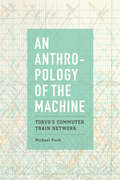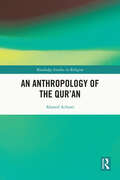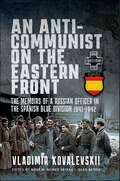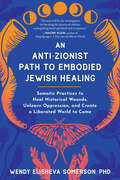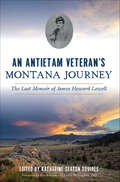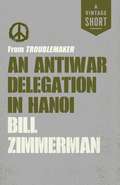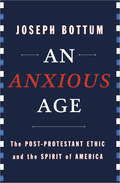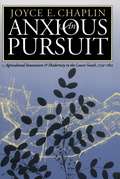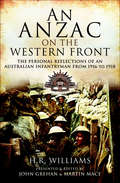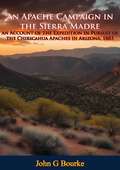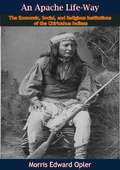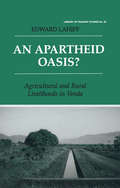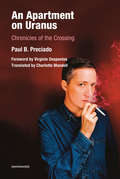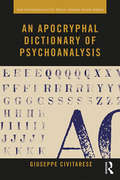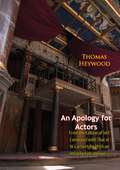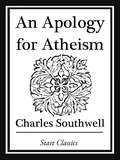- Table View
- List View
An Anthropology of Marxism (Race And Representation Ser.)
by Cedric J. RobinsonAn Anthropology of Marxism offers Cedric Robinson's analysis of the history of communalism that has been claimed by Marx and Marxists. Suggesting that the socialist ideal was embedded both in Western and non-Western civilizations and cultures long before the opening of the modern era and did not begin with or depend on the existence of capitalism, Robinson interrogates the social, cultural, institutional, and historical materials that were the seedbeds for communal modes of living and reimagining society. Ultimately, it pushes back against Marx's vision of a better society as rooted in a Eurocentric society, and cut off from its own precursors. Accompanied by a new foreword by H.L.T. Quan and a preface by Avery Gordon, this invaluable text reimagines the communal ideal from a broader perspective that transcends modernity, industrialization, and capitalism.
An Anthropology of Money: A Critical Introduction (Routledge Series for Creative Teaching and Learning in Anthropology)
by Richard H. Robbins Tim Di MuzioAn Anthropology of Money: A Critical Introduction shows how our present monetary system was imposed by elites and how they benefit from it. The book poses the question: how, by looking at different forms of money, can we appreciate that they have different effects? The authors demonstrate how modern money requires perpetual growth, an increase in inequality, environmental devastation, increasing commoditization, and, consequently, the perpetual consumption of ever more stuff. These are not intrinsic features of money, but, rather, of debt-money. This text shows that, through studying money in other cultures, we can have money that better serves the broader goals of society.
An Anthropology of Puzzles: The Role of Puzzles in the Origins and Evolution of Mind and Culture
by Marcel DanesiAn Anthropology of Puzzles argues that the human brain is a "puzzling organ" which allows humans to literally solve their own problems of existence through puzzle format. Noting the presence of puzzles everywhere in everyday life, Marcel Danesi looks at puzzles in society since the dawn of history, showing how their presence has guided large sections of human history, from discoveries in mathematics to disquisitions in philosophy. Danesi examines the cognitive processes that are involved in puzzle making and solving, and connects them to the actual physical manifestations of classic puzzles. Building on a concept of puzzles as based on Jungian archetypes, such as the river crossing image, the path metaphor, and the journey, Danesi suggests this could be one way to understand the public fascination with puzzles. As well as drawing on underlying mental archetypes, the act of solving puzzles also provides an outlet to move beyond biological evolution, and Danesi shows that puzzles could be the product of the same basic neural mechanism that produces language and culture. Finally, Danesi explores how understanding puzzles can be a new way of understanding our human culture.
An Anthropology of Robots and AI: Annihilation Anxiety and Machines (Routledge Studies in Anthropology #20)
by Kathleen RichardsonThis book explores the making of robots in labs at the Massachusetts Institute of Technology (MIT). It examines the cultural ideas that go into the making of robots, and the role of fiction in co-constructing the technological practices of the robotic scientists. The book engages with debates in anthropological theorizing regarding the way that robots are reimagined as intelligent, autonomous and social and weaved into lived social realities. Richardson charts the move away from the “worker” robot of the 1920s to the “social” one of the 2000s, as robots are reimagined as companions, friends and therapeutic agents.
An Anthropology of Robots and AI: Annihilation Anxiety and Machines (Routledge Studies in Anthropology)
by Kathleen RichardsonThis book explores the making of robots in labs at the Massachusetts Institute of Technology (MIT). It examines the cultural ideas that go into the making of robots, and the role of fiction in co-constructing the technological practices of the robotic scientists. The book engages with debates in anthropological theorizing regarding the way that robots are reimagined as intelligent, autonomous and social and weaved into lived social realities. Richardson charts the move away from the “worker” robot of the 1920s to the “social” one of the 2000s, as robots are reimagined as companions, friends and therapeutic agents.
An Anthropology of the Enlightenment: Moral Social Relations Then and Today (Association Of Social Anthropologists Monographs)
by Nigel Rapport Huon WardleIn a time of intellectual uncertainty, the question of how we know what we do about human lives becomes ever more pressing. The essays collated in this volume argue that anthropology can be used to acknowledge, explore and interpret divergence and ideological conflict over human meaning. Using questions raised as part of the Enlightenment movement, this volume is structured around some of the key themes the Enlightenment fostered, including human nature, time, Earth and the Cosmos, beauty, order, harmony and design, moral sentiments, and the query of whether wealthy nations make for healthy publics. The volume focuses in particular on how 'moral sentiment' offered a guiding idea in Enlightenment thought. The idea of 'moral sentiment' is central to the essays' grappling with the ethical anxieties of contemporary anthropology. The essays therefore trace historical connections and fissures and focus on Adam Smith's attempts toward an understanding of what would later be called 'modernity'. With an afterword from Marilyn Strathern, this volume will be a strong addition to the Association of Social Anthropologists conference proceedings.
An Anthropology of the European Union: Building, Imagining and Experiencing the New Europe
by Irène BellierOne of the problems facing Europe is that the building of institutional Europe and top-down efforts to get Europeans to imagine their common identity do not necessarily result in political and cultural unity. Anthropologists have been slow to consider the difficulties presented by the expansion of the EU model and its implications for Europe in the 21st Century. Representing a new trend in European anthropology, this book examines how people adjust to their different experiences of the new Europe. The role of culture, religion, and ideology, as well as insiders' social and professional practices, are all shown to shed light on the cultural logic sustaining the institutions and policies of the European Union. On the one hand, the activities of the European institutions in Brussels illustrate how people of many different nationalities, languages and cultures can live and work together. On the other hand, the interests of many people at the local, regional and national levels are not the same as the Eurocrats'. Contributors explore the issues of unity and diversity in ‘Europe-building' through various European institutions, images, and programmes, and their effects on a variety of definitions of identity in such locales as France, Denmark, the United Kingdom, Ireland and Belgium.
An Anthropology of the Irish in Belgium: Belonging, Identity and Community in Europe
by Sean O’ DubhghaillThe first anthropological account of the Irish diaspora in Europe in the 21st century, this book provides a culture-centric examination of the Irish diaspora. Focusing less on an abstract or technical definition of Irish self-identification, the author allows members of this group to speak through vignettes and interview excerpts, providing an anthropological lens that allows the reader to enter a frame of self-reference. This book therefore provides architecture to understand how diasporic communities might understand their own identities in a new way and how they might reconsider the role played by mobility in changing expressions of identity. Providing firsthand, experiential and narrative insight into the Irish diaspora in Europe, this volume promises to contribute an anthropological perspective to historical accounts of the Irish overseas, theoretical works in Irish studies, and sociological examinations of Irish identity and diaspora.
An Anthropology of the Machine: Tokyo's Commuter Train Network
by Michael Fisch“An astute account of [Tokyo’s] commuter train network . . . and an intellectually stimulating invitation to rethink the interaction between humans and machines.” —Japan ForumWith its infamously packed cars and disciplined commuters, Tokyo’s commuter train network is one of the most complex technical infrastructures on Earth. In An Anthropology of the Machine, Michael Fisch provides a nuanced perspective on how Tokyo’s commuter train network embodies the lived realities of technology in our modern world. Drawing on his fine-grained knowledge of transportation, work, and everyday life in Tokyo, Fisch shows how fitting into a system that operates on the extreme edge of sustainability can take a physical and emotional toll on a community while also creating a collective way of life—one with unique limitations and possibilities.An Anthropology of the Machine is a creative ethnographic study of the culture, history, and experience of commuting in Tokyo. At the same time, it is a theoretically ambitious attempt to think through our very relationship with technology and our possible ecological futures. Fisch provides an unblinking glimpse into what it might be like to inhabit a future in which more and more of our infrastructure—and the planet itself—will have to operate beyond capacity to accommodate our ever-growing population.“Not a ‘rage against the machine’ but an urge to find new ways of coexisting with technology.” —Contemporary Japan“An extraordinary study.” —Ethnos“A fascinating in-depth account of the innovations, inventions, sacrifices, and creativity required to ensure Tokyo’s millions of commuters keep rolling. It also provides much food for thought as our transportation systems become increasingly reliant on automated technology.” —Pacific Affairs
An Anthropology of the Qur’an (Routledge Studies in Religion)
by Ahmed AchratiThis book presents an anthropological study of the Qur’an, offering an unprecedented challenge to some of the epistemological and metaphysical assumptions of the tawḥīdic discourses. Combining primary textual materials and anthropological analysis, this book examines transcendence as a core principle of the Qur’an, uniquely signified in the divine name al-Quddūs (the Holy). It shows how the tawḥīdic representations of Allah constitute an inversion of this attribute; examines how this inversion has been conceived, authorized, and maintained; and demonstrates how it has affected Islamic thinking and practices, especially as relates to authority. This book also explores how a return to the Qur’anic primacy of God’s otherness as al-Quddūs can influence Islamic thinking and practices moving forward. Therefore, it will be highly useful to scholars of Islamic Studies, philosophical theology, Qur’anic studies, political science, ethics, anthropology, and religious studies.
An Anti-Communist on the Eastern Front: The Memoirs of a Russian Officer in the Spanish Blue Division 1941-1942
by Vladimir KovalevskiVladimir Kovalevskii’s memoirs record in graphic detail a remarkable military career. As a soldier, a committed anti-communist and Russian patriot he saw from the inside a series of conflicts that ravaged Europe in the first half of the twentieth century. In the First World War he fought the Germans, as a White Russian he opposed the Bolsheviks. He joined the French Foreign Legion and served in Africa before fighting for Franco in the Spanish Civil War and for Hitler in the Spanish Blue Division on the Eastern Front in the Second World War. His memoirs give a vivid insight into the armies he fought with and the causes he fought for – and they show how eventually the mental toll became so great that he was devoured by his own contradictions and the contradictions of his times. His experiences on the Eastern Front during the Second World War were shocking. He hoped the German campaign in the Soviet Union would liberate the Russian people, but after witnessing the grim suffering inflicted on the civilian population by a brutal occupying army he was deeply disillusioned and tormented by a sense of guilt. In the late 1940s, in order to make sense of his life as a soldier and to document the extraordinary sights he’d seen, he wrote these memoirs in Russian. They were buried in an archive for over seventy years, but they have now been edited, annotated and translated for this first English edition.
An Anti-Zionist Path to Embodied Jewish Healing: Somatic Practices to Heal Historical Wounds, Unlearn Oppression, and Create a Liberated World to Come
by Wendy Elisheva Somerson PhDUnapologetically anti-Zionist and firmly rooted in Jewish spiritual values—a liberatory model for Jewish healing Body-based tools and faith-based practices for processing trauma, reclaiming our agency, and building a world where "never again" means "never again for anyone""...an accessible pathway for healing from historical trauma, releasing it from our bodies, and preventing it from being passed on to future generations. This may well be the missing piece for breaking the pattern of violence undergirding Israeli apartheid and occupation.&”—Naomi Klein, author of Doppelganger: A Trip Into the Mirror World Dr. Wendy Elisheva Somerson, PhD, shows how Jewish history lives in Jewish bodies—and how antisemitism and oppression disrupt our access to safety, dignity, and belonging. This unmetabolized trauma can lock us into a survival state that brings historical grief into the present moment…and keep us from exploring critical questions that help us tend our legacies and live into a better world.How does ancestral grief live on in our bodies and keep us from feeling safe—and how is that fear enacted on other peoples? How do we reconcile a history of persecution with the state power of Israel today?Each chapter invites us back into the body, exploring healing as a spiritual and political reclamation. With skills-based wisdom for trauma, safety, spiritually grounded intentions, and resourcing ourselves for difficult conversations, this book also helps readers understand: Trauma and healing through our bodiesJewish longing, belonging, legacies of assimilationHealing shame—of not being Jewish enough, of being too much, and of being complicitEmbodied experiences of Jewish resilience, ritual, and griefRooted in justice, care, and spiritual depth, this book asks us to live into a Judaism beyond Zionism. It invites us to heal toward liberation—to reclaim Jewish faith and release Jewish identity from the colonial project of Israel in power, skill, and community.
An Antietam Veteran's Montana Journey: The Lost Memoir of James Howard Lowell (Civil War Series)
by Katharine Seaton SquiresIn this recently unearthed memoir, Civil War veteran James Howard Lowell offers a firsthand account of his brutal journey west on a wagon train attacked by Indian Dog Soldiers. The Boston Yank staggers snow blind through a Laramie Plains blizzard to reach Salt Lake City, where he meets Brigham Young. In Montana, he joins an old forty-niner to work a mining claim, practices "tomahawk jurisprudence" in Fort Benton and builds a mackinaw to head downriver through Deadman Rapids to trade with the Crow and Gros Ventre tribes. Lowell's great-great-granddaughter edits this tale populated with colorful characters, narrow escapes and important historical events, such as the Baker Massacre. It features Lowell's letters to his sweetheart and Civil War correspondence.
An Antiwar Delegation in Hanoi: from Troublemaker
by Bill ZimmermanBill Zimmerman put his life at risk for the greater social good when he smuggled medicines to the front lines in North Vietnam and spent time filming in Hanoi under U.S. bombardment. In his extraordinary political memoir, he takes us into the hearts and minds of those making the social revolution of the sixties. Zimmerman—who crossed paths with political organizers and activists like Abbie Hoffman, Daniel Ellsberg, César Chávez, Jane Fonda, and Tom Hayden—captures a groundbreaking zeitgeist that irrevocably changed the world as we knew it.A Vintage Shorts Vietnam Selection. An ebook short.
An Anxious Age
by Joseph BottumWe live in a profoundly spiritual age, but not in any good way. Huge swaths of American culture are driven by manic spiritual anxiety and relentless supernatural worry. Radicals and traditionalists, liberals and conservatives, together with politicians, artists, environmentalists, followers of food fads, and the chattering classes of television commentators: America is filled with people frantically seeking confirmation of their own essential goodness. We are a nation desperate to stand of the side of morality--to know that we are righteous and dwell in the light. In An Anxious Age, Joseph Bottum offers an account of modern America, presented as a morality tale formed by a collision of spiritual disturbances. And the cause, he claims, is the most significant and least noticed historical fact of the last fifty years: the collapse of the mainline Protestant churches that were the source of social consensus and cultural unity. Our dangerous spiritual anxieties, broken loose from the churches that once contained them, now madden everything in American life. Updating The Protestant Ethic and the Sprit of Capitalism, Max Weber's sociological classic, An Anxious Age undertakes two case studies of contemporary social classes adrift in a nation without the religious understandings that gave them meaning. Looking at the college-educated elite he calls "the Poster Children," Bottum sees the post-Protestant heirs of the old mainline Protestant domination of culture: dutiful descendants who claim the high social position of their Christian ancestors even while they reject their ancestors' Christianity. Turning to the Swallows of Capistrano, the Catholics formed by the pontificate of John Paul II, Bottum evaluates the early victories--and later defeats--of the attempt to substitute Catholicism for the dying mainline voice in public life. Sweeping across American intellectual and cultural history, An Anxious Age traces the course of national religion and warns about the strange angels and even stranger demons with which we now wrestle. Insightful and contrarian, wise and unexpected, An Anxious Age ranks among the great modern accounts of American culture.From the Hardcover edition.
An Anxious Pursuit
by Joyce E. ChaplinIn An Anxious Pursuit, Joyce Chaplin examines the impact of the Enlightenment ideas of progress on the lives and minds of American planters in the colonial Lower South. She focuses particularly on the influence of Scottish notions of progress, tracing the extent to which planters in South Carolina, Georgia, and British East Florida perceived themselves as a modern, improving people. She reads developments in agricultural practice as indices of planters' desire for progress, and she demonstrates the central role played by slavery in their pursuit of modern life. By linking behavior and ideas, Chaplin has produced a work of cultural history that unites intellectual, social, and economic history.Using public records as well as planters' and farmers' private papers, Chaplin examines innovations in rice, indigo, and cotton cultivation as a window through which to see planters' pursuit of a modern future. She demonstrates that planters actively sought to improve their society and economy even as they suffered a pervasive anxiety about the corrupting impact of progress and commerce. The basis for their accomplishments and the root of their anxieties, according the Chaplin, were the same: race-based chattel slavery. Slaves provied the labor necessary to attain planters' vision of the modern, but the institution ultimately limited the Lower South's ability to compete in the contemporary world.Indeed, whites continued to wonder whether their innovations, some of them defied by slaves, truly improved the region. Chaplin argues that these apprehensions prefigured the antimodern stance of the antebellum period, but she contends that they were as much a reflection of the doubt inherent in theories of progress as an outright rejection of those ideas.
An Anzac on the Western Front: The Personal Reflections of an Australian Infantryman from 1916 to 1918
by H.R. Williams&“A remarkably candid and graphic account&” of the World War I service of a member of the Australian and New Zealand Army Corps (Britain at War Magazine). Having enlisted in 1915 and serving in the 56th Battalion Australian Imperial Force, Harold Roy Williams arrived in France, from Egypt, on June 30, 1916. He describes the horrors of the Fromelles battlefield in shocking clarity and the conditions the troops had to endure are revealed in disturbing detail. Surviving a later gas attack, Harold Williams&’s subsequent postings read like a tour of the Western Front. Following the Somme, there was the mud and squalor of the line south of Ypres, the German Spring Offensive of 1918, the Battle of Amiens—frequently described as the most decisive battle against the Germans in France and Flanders—the capture of Villers-Bretonneux and, finally, the assault on Péronne. Injured at Péronne and invalided back to the United Kingdom, Williams survived the war to return to Australia in 1919. An Anzac on the Western Front is his vivid description of his service in the First World War—an account that was described as &“the best soldier&’s story . . . yet read in Australia&” when it was first published. &“Williams&’ experience was defined by his rise from private soldier to platoon commander and he confined his writing to it. This is a story of cold, hunger, injury, fear, humour, friendship and death . . . So bloody good.&” —War History Online
An Apache Campaign in the Sierra Madre: an Account of the Expedition in Pursuit of the Chiricahua Apaches in Arizona, 1883
by John G Bourke“With Crook in pursuit of Geronimo and his band.The author of this book was a U.S. soldier in addition to being a well known and highly regarded author on the Apache Wars of the later nineteenth century-in which he was an active participant. He maintained an interest, respect for and in some measure an affection for the Apaches and he also made a serious study of and wrote notable works on their customs and culture. He is perhaps best known for his classic account of the Apache Wars, 'On the Border with Crook.' This small account was written prior to his larger and more expansive work. It originally appeared as a series of articles in the Boston published 'Outing Magazine.' Bourke decided to bring his earlier writings back into print in book form, at a time when the Apaches had once again taken the war trail, to provide the American public with context to then current events. This fascinating account, which centres on the events of the Spring of 1883, concerns Crook's pursuit of the Chiricahua Apaches who broke out of San Carlos reservation to raid through Arizona and Mexico before vanishing into the fastness of the Sierra Madre. Those with any interest or knowledge in this subject will find themselves familiarly introduced to the corps of Apache Scouts, Al Sieber (Zieber), the scout and interpreter, Crook, Gatewood, Chato and of course the renowned Geronimo, as well as other names long associated with this remarkable time in the history of the Apaches and Arizona.”-Print ed.
An Apache Life-Way: The Economic, Social, and Religious Institutions of the Chiricahua Indians
by Morris Edward OplerA majority of ethnographer Morris Edward Opler’s research was done on Native American groups of the American Southwest. He studied specifically the Chiricahua Indians, who were the subjects of one of his most famous books, An Apache Life-Way: The Economic, Social, and Religious Institutions of the Chiricahua Indians. Opler studied many Native American groups, but the Apache were a main focus of his.An Apache Life-Way traces the life of an Apache year by year. Rather than a history, the book explains the day-to-day Apache experience, detailing the chronological order of one’s life. The lifestyle described in the book is from a time before the Americans started the long era of hostile interactions with the Apache.The people designated as “Apache” in this book are those who spoke the Apache language in the area that is now New Mexico, Arizona, Sonora, and Chihuahua. There were many smaller sub-groups that populated these areas, three of them different groups of the Chiricahua Apache.An Apache Life-Way is divided into several main parts: Childhood; Maturation; Social Relations of Adults; Folk Beliefs, Medical Practice, and Shamanism; Maintenance of the Household; Marital and Sexual Life; The Round of Life; Political Organization and Status; and Death, Mourning, and the Underworld. Each section is divided into more specific subcategories that explore each phase of life and the rituals associated with it.Originally published in 1941, An Apache Life-Way remains one of the most important and innovative studies of south-western Native Americans.“First-class...in the best ethnographic tradition. It fills a great gap in our anthropological knowledge and...deserves to be one of the most used of American tribal records.”—Ruth Benedict, author of Patterns of Culture
An Apartheid Oasis?: Agriculture and Rural Livelihoods in Venda
by Edward LahiffThis is a socio-economic study of agriculture and its contribution to livelihoods in Venda, one of the black "homelands" created in South Africa under apartheid. It is based on a survey of households in the Tshiombo irrigation scheme, a project in central Venda with around 600 plot-holders.
An Apartment on Uranus: Chronicles of the Crossing (Semiotext(e) / Foreign Agents)
by Paul B. PreciadoA “dissident of the gender-sex binary system” reflects on gender transitioning and political and cultural transitions in technoscientific capitalism.Uranus, the frozen giant, is the coldest planet in the solar system as well as a deity in Greek mythology. It is also the inspiration for uranism, a concept coined by the writer Karl Heinrich Ulrich in 1864 to define the “third sex” and the rights of those who “love differently.” Following Ulrich, Paul B. Preciado dreams of an apartment on Uranus where he might live beyond existing power, gender and racial strictures invented by modernity. “My trans condition is a new form of uranism,” he writes. “I am not a man. I am not a woman. I am not heterosexual. I am not homosexual. I am not bisexual. I am a dissident of the gender-sex binary system. I am the multiplicity of the cosmos trapped in a binary political and epistemological system, shouting in front of you. I am a uranist confined inside the limits of technoscientific capitalism.”This book recounts Preciado's transformation from Beatriz into Paul B., but it is not only an account of gender transitioning. Preciado also considers political, cultural, and sexual transition, reflecting on issues that range from the rise of neo-fascism in Europe to the technological appropriation of the uterus, from the harassment of trans children to the role museums might play in the cultural revolution to come. An Apartment on Uranus is a bold, transgressive, and necessary book.
An Ape’s View of Human Evolution
by Peter AndrewsOur closest living relatives are the chimpanzee and bonobo. We share many characteristics with them, but our lineages diverged millions of years ago. Who in fact was our last common ancestor? Bringing together ecology, evolution, genetics, anatomy and geology, this book provides a new perspective on human evolution. What can fossil apes tell us about the origins of human evolution? Did the last common ancestor of apes and humans live in trees or on the ground? What did it eat, and how did it survive in a world full of large predators? Did it look anything like living apes? Andrews addresses these questions and more to reconstruct the common ancestor and its habitat. Synthesising thirty-five years of work on both ancient environments and fossil and modern ape anatomy, this book provides unique new insights into the evolutionary processes that led to the origins of the human lineage.
An Apocryphal Dictionary of Psychoanalysis (Psychoanalytic Field Theory Book Series)
by Giuseppe CivitareseAn Apocryphal Dictionary of Psychoanalysis is a book of transpositions, collecting together the author’s clinical vignettes, enigmatic objects, stray thoughts, projects, images, notes from readings, and musings; but also remarks on films and exhibitions, memories, episodes from daily life, summaries of papers to write, questions, doubts and obsessions - all of which have shaped the author’s understanding of psychoanalysis. Born from moments in which the author has sensed a solution for problems encountered in daily work or for obscure but exciting points of the theory, the entries are ordered in an apocryphal manner, offering a personal and challenging view of psychoanalysis. Like small epiphanies in which there is always an emotion - be it that of amusement, astonishment, gratitude, sadness, joy – they express the style of the analyst and of the person in treating mental suffering and give a glimpse into the imaginary which nurtures it. Ideas for psychoanalysis are outlined where at centre stage is the ability to wait, to be surprised; to operate from the place of the unconscious, which by definition is a place of negativity, and to exercise a form of soft scepticism – ultimately, a mode of hospitality. An Apocryphal Dictionary of Psychoanalysis will be of great use to psychoanalysts and psychoanalytic psychotherapists.
An Apology for Actors: From the Edition of 1612, Compared with That of W. Cartwright. With an introduction and notes
by Thomas HeywoodHeywood is a good example of the professional dramatist who worked for Philip Henslowe, the theatrical manager, both as a playwright and an actor. By his own admission, Heywood claimed to have "either an entire hand or at least the main finger" in 220 plays, of which less than 30 survive. His best-known play, A Woman Killed with Kindness (1603), exemplifies domestic tragedy, in which sentiment and homely details are equally mingled. Heywood wrote an eloquent defense of the theater against Puritan attack called An Apology for Actors (1607-08). Heywood suggests here that the stage can both delight and teach.-Print ed.
An Apology for Atheism
by Charles SouthwellIt would be absurd to doubt that religion has an important bearing on all the relations and conditions of life. The connexion between religions faith and political practice is, in truth, far closer than is generally thought. Public opinion has not ripened into a knowledge that religious error is the intangible but real substratum of all political injustice. Though the 'schoolmaster' has done much, there still remain and hold some away among us, many honest and energetic assertors of 'the rights of man,' who have to learn that a people in the fetters of superstition, can never achieve political freedom. Many of these reformers admit the vast, the incalculable influence of Mahommedanism on the politics of Constantinople, and yet persist in acting as if Christianity had little or nothing to do with the politics of England.
